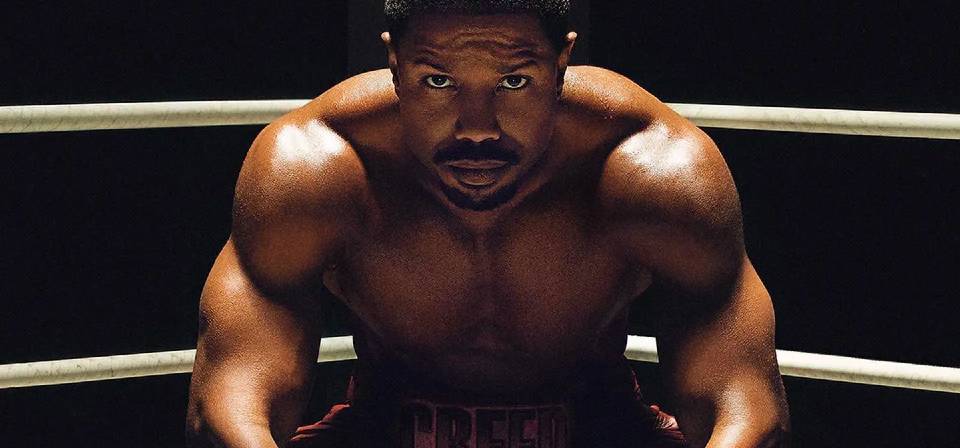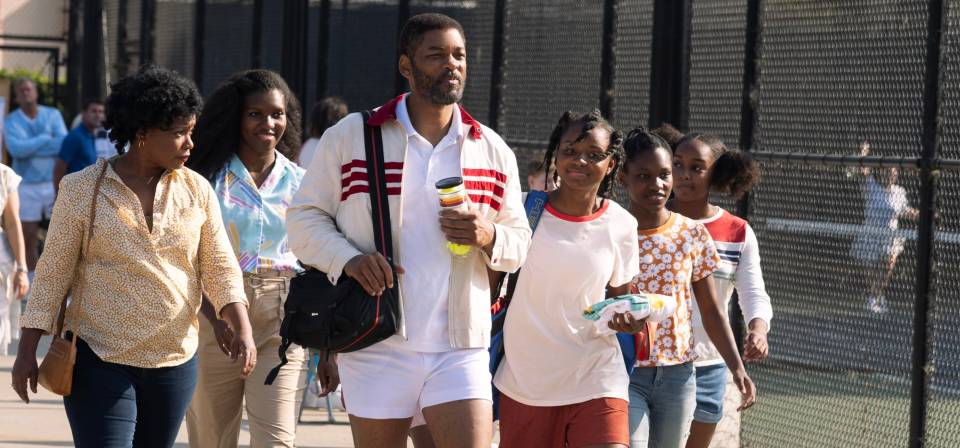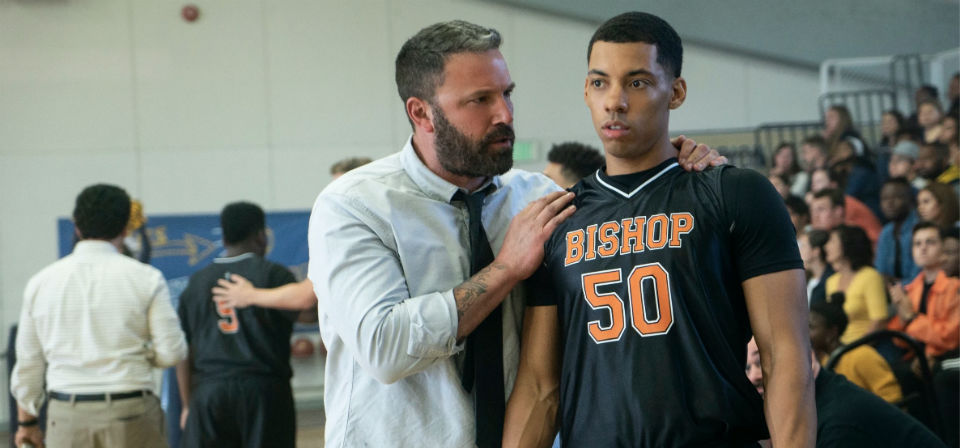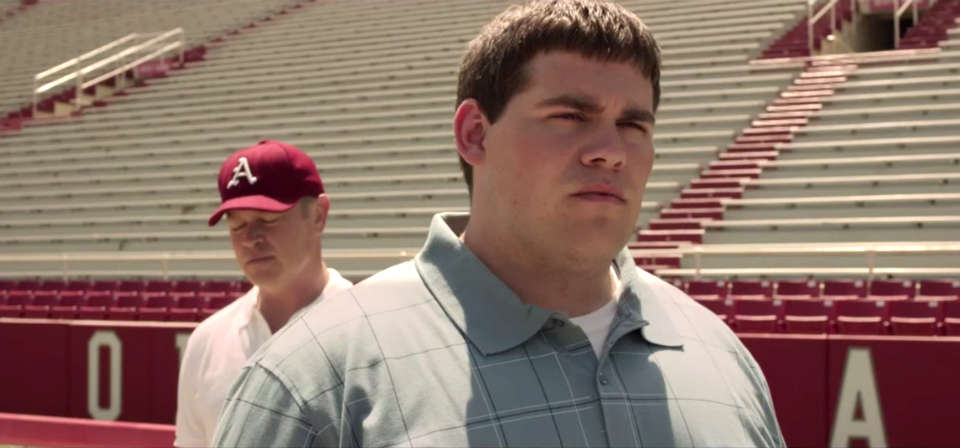Tags :: Sports

The spirit of Rocky lives on in the Creed trilogy
Sports movies are among the most durable of genres, and nostalgia sequels and long-running franchises have become almost the norm for popular movies from the past half-century, but the legacy of Rocky is unique.

King Richard (2021)
As rousing sports films and inspirational biopics go, while King Richard is far from a pitiless, warts-and-all inquiry, it has a particular kind of truthfulness, analogous to the truthfulness of a family scrapbook or stories recounted at family reunions.

The Way Back (2020)
The Way Back blends the beats of two familiar genres, the underdog sports movie and the addiction and recovery movie, in the process finding a rhythm that feels at once familiar and not quite like anything I’ve seen before.

Greater (2016)
Greater has three surprises, which is three more than most faith-based films, particularly of the inspirational sports-movie variety.
When the Game Stands Tall
Sports movies love underdogs scrapping their way to the top. When the Game Stands Tall is about what happens when a ridiculously successful team finally stumbles.
Million Dollar Arm [video] (2014)
What happens when an American sports agent goes to the land of cricket, the Taj Mahal and endless traffic jams looking for anyone who can pitch upwards of 80mph?
42 [video]
42 in 60 seconds: my “Reel Faith” review.
The Mighty Macs (2011)
The movie is full of Catholic iconography that Catholic viewers and fans of Golden Age Hollywood Catholicism will appreciate. Statues of Jesus, Mary and the saints are everywhere. I compared the movie’s Catholic milieu to a Bing Crosby film, but a Crosby film would actually have edgier personalities and more conflict.
Real Steel (2011)
Real Steel is just plain unpleasant to sit through. So much of the movie is spent amid screaming crowds and abrasive music, often in dark, trashy dives, watching giant robots pound each other into scrap metal. The robot boxing is surprisingly good (Sugar Ray Leonard was a consultant). It’s the humans that are unpleasant.
Moneyball (2011)
Moneyball is an ugly name for such an exhilarating film. Indeed, it seems a misnomer, though the filmmakers were more or less stuck with it, since Michael Lewis’s explosive 2003 book, on which the film is based, made such an impact on the baseball world that the word has passed into baseball jargon.
Warrior (2011)
Warrior opens with a rash of Christian iconography and references: a Pittsburgh church adorned with Eastern-style three-bar crosses from which we see Paddy Conlon (Nick Nolte) emerge; a rosary dangling from his rearview mirror as he drives home to discover his estranged son Tommy (Tom Hardy) waiting on the stoop of his house; a Bible that Tommy contemplates on Paddy’s table.
Soul Surfer (2011)
Soul Surfer does nearly everything you expect it to, but it does it more likably and satisfyingly than you might think it would. Based on 21-year-old pro surfer Bethany Hamilton’s memoir Soul Surfer: A True Story of Faith, Family and Fighting to Get Back on the Board, it’s an inspirational sports biopic about a Hawaiian surfer whose devout faith helps her bounce back after losing an arm in a shark attack (at 13 in real life).
Secretariat (2010)
The Old Testament book of Job may be an unlikely source for an epigram for a feel-good Disney sports movie, but Secretariat screenwriter Mike Rich (The Nativity Story) has a good reason for going to this least feel-good of all biblical books. If God wasn’t actually thinking of Secretariat when he challenged Job in chapter 39, at least Secretariat was about as perfect an embodiment of what God had in mind, not only when he spoke to Job, but when he created the horse in the first place.
The Blind Side (2009)
Leigh Anne Tuohy (Sandra Bullock) is a red-state, family-values, guns-and-religion Erin Brockovich. Righteous, indomitable, unflappable, glamorous in plunging necklines and thigh-hugging skirts, she’s also a pistol-packing mama, a happily married homemaker and mother of two, a Bible-belt Evangelical and a dyed-in-the-wool gridiron junkie. She isn’t crass like Julia Roberts’ Oscar-winning part, but she’s as blunt and direct as an offensive tackle, and about as apt to be cowed by other people’s crass or intimidating behavior.
The Express (2008)
The Express is a rare inspirational sports film that remembers who sports are supposed to inspire: other people.
We Are Marshall (2006)
More than most films of its ilk, We Are Marshall rises above the clichés that define the genre, connecting sport to larger issues in an emotionally satisfying way.
Facing the Giants (2006)
With fans of its two genres, especially in the Bible Belt, Facing the Giants will doubtless be a success. To reach a broader audience, though, the filmmakers will have to scrap their playbook and learn a whole new set of rules.
The Greatest Game Ever Played (2005)
The Greatest Game Ever Played is perhaps the most visually and emotionally dynamic film ever made about a game of golf — perhaps the most visually and emotionally dynamic possible film about a game of golf.
Cinderella Man (2005)
Here Crowe overturns another Hollywood convention in an equally strong performance as a boxer who isn’t a morally checkered, socially alienated single man with a history of extracurricular violence and troubling relationship issues (cf. Rocky, Raging Bull, The Boxer), but a wholly decent, self-controlled, devoted family man. He’s not only Cinderella, he’s Prince Charming too.
Million Dollar Baby (2004)
By the film’s end, Frankie is faced with a choice that the priest says could lead to his damnation. The film makes the wrong choice seem right. But it leaves it an open question, I think, whether making that choice leads to redemption or damnation. Million Dollar Baby suggests, perhaps, that the right and most loving thing to do for someone else may entail one’s own damnation. This is very far from good way of looking at things. But it suggests a film that is less complacent, more thoughtful, less like smug propaganda than some of its detractors allege.
Hoosiers (1986)
Hoosiers is more than a sports film — it’s a rousing story of redemption that cares deeply enough and is knowledgeable enough about the game to thrill the most demanding devotee, yet also cares deeply enough about its characters and larger themes that they matter in themselves, and aren’t just there for the sake of the game.
Chariots of Fire (1981)
Two very different approaches to religion and sport are at the heart of Chariots of Fire, a period piece that explores timeless themes of temporal ambitions and higher purposes, of commitment and sacrifice, of ability and spirit.
Sports and Coaching, Life and Death: Coach Carter & Million Dollar Baby
Coach Carter is based on the real-life story of Ken Carter, an uncompromising high-school basketball coach at a tough urban school who requires more from his players than great basketball. He insists that they sign contracts requiring them to attend classes, sit in the front row, and maintain a C-plus grade point average or better — and is willing to lock the gym and forfeits games if they fall behind in their classes.
Bobby Jones: Stroke of Genius (2004)
The most successful sports movies (recent examples include Miracle, 61*, and The Rookie (starring Caviezel’s Frequency costar Dennis Quaid), reach out across the divide separating fans from non-fans, finding ways of making the drama compelling to the uninitiated as well as aficionados. Bobby Jones, while sweetly sincere and uplifting, doesn’t fully succeed in doing this.
Miracle (2004)
Miracle manages the neat trick of establishing this game as much more than a game without making it all about politics or turning the Soviet players into ideological bad guys. Like Seabiscuit, with its Depression-era tale of a scrappy underdog racehorse taking on the much-favored champion thoroughbreds, Miracle establishes its setting in a time when American spirit is at a low ebb and people are ready to rally behind an underdog hero who can help them believe in comebacks and David-and-Goliath upsets.
Looney Tunes: Back in Action (2003)
(Written by Jimmy Akin) Kids will definitely want to see it, as will die-hard adult fans of the Looney Tunes characters. For their purposes, the movie is a resounding success. It gives us a big screen adaptation of the Looney Tunes characters which is faithful to the characters we grew up with. Their comic sensibilities are the same, the timing is the same, even many of the jokes are the same. And that’s part of the problem: There is a little too much sameness about all this.
Radio (2003)
But Radio isn’t really interested enough in its title character as a person to show us much in the way of his supposedly edifying behavior. Radio is less an active character in his own film than a passive recipient of kindness or cruelty, a subject of debate and controversy, a political football to be kicked around. When high-school students between classes cheerfully greet Radio as he cautions them not to run in the hall, the point isn’t how much he cares about them, but how much they care about him.
The Rookie (2002)
There’s an easygoing, folksy charm to this film, accentuated by a country-themed soundtrack and characters who say such things as “I’m gonna need a longer street for that talk” and “Lord knows I’m ready for both sides of the bed to be warm again.”
Bend It Like Beckham (2002)
Movie audiences reliably enjoy just about every ingredient involved in Bend It Like Beckham, an East-meets-West comedy about an Indian family living in London’s Hounslow borough.
Recent
- Benoit Blanc goes to church: Mysteries and faith in Wake Up Dead Man
- Are there too many Jesus movies?
- Antidote to the digital revolution: Carlo Acutis: Roadmap to Reality
- “Not I, But God”: Interview with Carlo Acutis: Roadmap to Reality director Tim Moriarty
- Gunn’s Superman is silly and sincere, and that’s good. It could be smarter.
Home Video
Copyright © 2000– Steven D. Greydanus. All rights reserved.